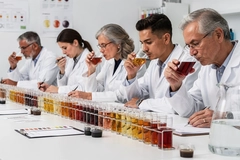
- Industry news
Industry news
- Category news
Category news
- Reports
- Key trends
- Multimedia
- Journal
- Events
- Suppliers
- Home
- Industry news
Industry news
- Category news
Category news
- Reports
- Key trends
- Multimedia
- Events
- Suppliers
European scientists call for EU rethink of “retrograde” gene-editing legislation

26 Jul 2019 --- Scientists across Europe are calling for a rethink on the restriction of genome editing technology by the newly-elected European Parliament and European Commission. The open statement is signed by 126 research institutes and comes exactly one year after the European Court of Justice (ECJ) ruled that plants obtained by gene editing should be treated as genetically modified organisms (GMOs). The statement argues that EU scientists and plant breeders should be allowed to use genome editing with CRISPR as a faster and more efficient way of producing food sustainably.
The call also comes just as Britain’s new Prime Minister Boris Johnson made remarks about genetically modified crops during his opening speech to Parliament. Johnson said the technology could help with the challenges of providing sustainable food and reduce the impact of climate change.

 It is vital that we make full use of innovative tools for sustainable food production.“The ruling a year ago was not based on any scientific evidence: to classify gene-edited crops as GMOs and equivalent to transgenic crops is completely incorrect by any scientific definition. We call on the European Parliament and European Commission to reverse this retrograde decision,” says Professor Nick Talbot, Director of The Sainsbury Laboratory, Norwich, UK. The institute, along with the UK-based John Innes Centre, is among the organizations calling for legislative change.
It is vital that we make full use of innovative tools for sustainable food production.“The ruling a year ago was not based on any scientific evidence: to classify gene-edited crops as GMOs and equivalent to transgenic crops is completely incorrect by any scientific definition. We call on the European Parliament and European Commission to reverse this retrograde decision,” says Professor Nick Talbot, Director of The Sainsbury Laboratory, Norwich, UK. The institute, along with the UK-based John Innes Centre, is among the organizations calling for legislative change.
Due to last year’s ECJ ruling, crops with even the smallest amount of CRISPR-mediated modification must conform to restrictive provisions, while other conventional and less precise mutation breeding techniques are exempt. As well as being more exact, gene-editing is also quicker than traditional breeding as it allows specific genes already in a plant species to be targeted and turned on or off. This could be used to rapidly correct harmful mutations that occur naturally over time, for example. The statement also notes that the technology helps producers grow high-yielding crops while decreasing chemical- and water-use.
Unlike GMO crops, where genes from other sources are inserted into random locations on a plant’s genome, gene editing does not result in DNA from other sources in the final plant. GMOs must currently follow strict European legislation issued in 2001, which differs from that of many other countries. The statement says that a small change of the European rules will place it in line with other nation’s legal frameworks.
“At a time when we are facing unprecedented challenges, it is essential that we can make full use of innovative tools for sustainable food production. The ECJ decision has had major negative impacts on Europe’s ability to respond to pressing global challenges,” adds Professor Dale Sanders, Director of the John Innes Centre.
The vilification of GMOs Many arguments against GMOs revolve around "unnaturalness."Although there are no proven health issues related to GM ingredients, consumer skepticism is largely centered on the idea of a theoretical impact on health. At the same time, there is suspicion associated with the possible environmental implications of altering the natural order of things. These suspicions make the GM movement incompatible with the current popular perception that natural and unadulterated diets lead to health and wellness. As a result, GMO-free claims are appearing most widely on products with an already natural or healthy profile. These include many products that do not traditionally contain GM ingredients, with the GMO-free message simply being used to reinforce and support other claims.
Many arguments against GMOs revolve around "unnaturalness."Although there are no proven health issues related to GM ingredients, consumer skepticism is largely centered on the idea of a theoretical impact on health. At the same time, there is suspicion associated with the possible environmental implications of altering the natural order of things. These suspicions make the GM movement incompatible with the current popular perception that natural and unadulterated diets lead to health and wellness. As a result, GMO-free claims are appearing most widely on products with an already natural or healthy profile. These include many products that do not traditionally contain GM ingredients, with the GMO-free message simply being used to reinforce and support other claims.
Scientists have long been pointing out the flimsiness of EU reasoning for regulating GMOs so strictly, with many arguments against the technology revolving around the arbitrary concept of “unnaturalness.” A recent study from the University of Copenhagen and the Technical University of Denmark highlighted this, along with how negative perception is hindering agricultural innovation from providing more sustainable and climate-friendly solutions.
The potential of gene-related technology was highlighted earlier this year, with scientists at the Agricultural Research Service and the Boyce Thompson Institute identifying a rare taste-enhancing gene in tomatoes. This could allow breeders to increase store-bought tomatoes’ flavor while preserving the traits that make them an economically profitable crop.
By Katherine Durrell









